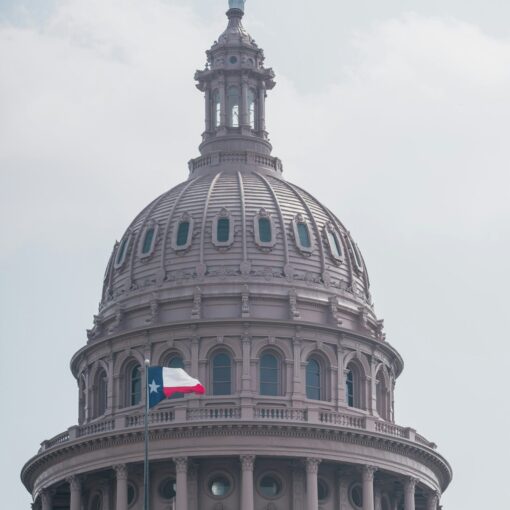 For a second time, the Securities and Exchange Commission (SEC) has passed the buck on its landmark climate disclosure rule, entitled The Enhancement and Standardization of Climate-Related Disclosures for Investors. The rule, finalized just last year, remains in legal limbo, as neither the SEC nor the courts seem eager to decide its fate.
For a second time, the Securities and Exchange Commission (SEC) has passed the buck on its landmark climate disclosure rule, entitled The Enhancement and Standardization of Climate-Related Disclosures for Investors. The rule, finalized just last year, remains in legal limbo, as neither the SEC nor the courts seem eager to decide its fate.
On July 23, the SEC notified the Eighth Circuit that it “does not intend to review or reconsider the Rules at this time,” and encouraged the court to “proceed with the litigation and decide the case.” The unusual filing communicates not only the SEC Commissioners’ majority view that the rule “lacks statutory authority,” but also the Commission’s unwillingness to undertake the administrative steps necessary to rescind a rule.
While atypical, the filing is consistent with other federal agencies’ tactics under the Trump Administration to avoid the traditional regulatory process, including public comment and economic analysis. The move prioritizes pursuing new policy goals over fulfilling existing agency responsibilities. It also cedes the near-term future of climate disclosure regulations to other jurisdictions – most prominently, the state of California and the European Union.
The SEC Disavows a Recently Finalized Rule, Inviting the Court to Limit Its Authority
New SEC leadership appointed by the Trump administration previously signaled their disavowal of the climate disclosure rule. That already represented a dramatic shift by a federal agency that only recently completed a painstaking effort to develop and finalize the rule, and stands as a vivid rebuke of the Biden administration’s whole-of-government effort to embed climate risk analysis across the financial sector. Still, the SEC’s current posture of self-sabotage is unusual. Federal agencies typically guard themselves against judicial scrutiny, asking courts to pause pending litigation if the agency revises its position on regulations.
This curious posture stems in part from the rule’s litigation history. Shortly after the SEC finalized the rule in March 2024, various fossil fuel interests and 26 states challenged its legality in court. Plaintiffs advanced a range of claims: that the rulemaking was arbitrary and capricious under the Administrative Procedure Act (APA), that the rule exceeded the SEC’s statutory authority, that the major questions doctrine barred it, and that it violated the First Amendment by compelling contentious political speech. Multiple cases were consolidated before the Eighth Circuit in Iowa v. SEC. The claims were fully briefed on September 26, 2024, with the SEC forcefully defending its rule, alongside 18 states and the District of Columbia who intervened in support. While a more proactive court might have scheduled oral argument on the petitions for review last fall, the Eighth Circuit did not do so.
Following the 2025 presidential transition, SEC officials took the unusual step of declaring that the Commission would no longer defend the rule – in effect, inviting the Eighth Circuit to terminate the rule for it. The SEC’s March 27, 2025 court filing and related press release did not address the plaintiffs’ legal arguments, merely describing this rule’s disclosure requirements as “costly and unnecessarily intrusive.” Indeed, the SEC noted that “the Court would not need to reach the petitioners’ challenges based on the First Amendment or non-delegation doctrine if it sets the Rules aside on other grounds.” One reading of this March filing is that the agency was encouraging the court to invalidate the rule on procedural, rather than constitutional, grounds, preserving the agency’s regulatory authority (in stark contrast to the recent July filing, as discussed below).
The intervening states subsequently requested that the court hold the case in abeyance, until the SEC clarified whether it had decided to rescind the rule under typical APA process. The Eighth Circuit agreed, granting the abeyance, and ordering the SEC to report whether it intended to review or reconsider the rule. The Eighth Circuit further instructed that if the agency chose to take no action, it should address whether it would adhere to the rule if upheld by the court – and if not, why it refused to review or reconsider the rule.
The SEC’s status update filed last week does not comply with these instructions. While the SEC states directly that it “does not intend to review or reconsider the Rules at this time,” the agency declines to answer whether it would abide by a court decision upholding the rule. In a lengthy discursion, the SEC characterizes the pending litigation as a “live controversy of national policy with critical economic and policy ramifications.” The agency specifies that “a majority of the current Commissioners believes that the Commission lacked statutory authority for the Rules,” and opines that a judicial decision “would conclusively resolve the dispute about the Commission’s power to adopt the mandatory disclosure obligations on climate risk in the Rules.” This is a significant shift in tone from the March update, and appears to invite a broader ruling from the Eighth Circuit. Rather than just rejecting the rule at issue, as a decision on APA procedural grounds would likely do, a decision on the agency’s legal authority to regulate climate risk disclosure could hamstring future attempts to promulgate regulations on this topic.
The Subversion of Procedure Across Federal Agencies
The specific questions posed to the SEC by the Eighth Circuit point to the problematic legal uncertainty resulting from the Trump administration’s non-committal approach. That approach results in either an interventionist approach from the courts, or a non-action scenario where the rule remains in place but lacks enforcement (with corporations left to risk non-compliance with a valid rule, guessing at whether subsequent administrations will enforce it).
The APA is supposed to prevent such regulatory vacuums from forming. Its framework emerged out of a broad Congressional compromise that preserved substantial decision-making authority for unelected agency officials, while requiring those officials to undertake a thorough and transparent decision-making process. Under the APA, the protocol for rescinding an agency rule typically includes a notice-and-comment process equivalent to the initial rulemaking, producing a record that includes facts and legal analysis sufficient to withstand court scrutiny. In Perez v. Mortgage Bankers Association (2015), for example, the U.S. Supreme Court held that the APA mandates “agencies use the same procedures when they amend or repeal a rule as they used to issue the rule in the first instance.”
As the SEC’s lone remaining Democratic nominee Caroline Crenshaw has noted, issuance of the Climate-Related Disclosures Rule followed four years of work by the Commission, synthesizing input from a wide range of stakeholders, including thousands of comment letters from investors and issuers. By disclaiming the rule now, the SEC attempts to avoid the similarly hard work of repealing the rule. As Commissioner Crenshaw put it, the SEC is “taking shortcuts in order to achieve preferred outcomes…. policy-making through avoidance and acquiescence, rather than policy-making through open, transparent, and public processes.”
Indeed, the second Trump administration has routinely flouted established norms for informed, transparent, lawful decision-making in order to advance its policy objectives. Sometimes, the administration’s evasion of procedural constraints has turned on an assertion of authority. For example, Executive Order 14264, instructing the Department of Energy to repeal its conservation-standards definition of “showerhead,” justified the change through a bald presidential assertion that “[n]otice and comment is unnecessary because I am ordering the repeal.” In another sweeping directive, an April 9 presidential memorandum orders agencies to repeal “facially unlawful” regulations (though presumably not recognized as unlawful by preceding agency leadership) without notice and comment, “where doing so is consistent with the ‘good cause’ exception.” Similarly, the Trump administration has issued direct final rules, typically reserved for mundane non-controversial topics, on high-stakes environmental processes such as LNG permitting, and on hot-button matters such as eliminating funding for sports organizations that allow trans athletes to compete under their chosen gender identification. Trump-led agencies have also simply declined to enforce rules, for instance, by suspending the Silica Rule regulating miners’ exposure to hazardous materials.
This short-circuiting of statutorily imposed obligations erodes the functioning of our constitutional structure, which separates power among the three branches while presuming each will fulfill its designated role in good faith. More specifically, the approach abdicates longstanding governance responsibilities in pursuit of short-term outcomes. Indeed, SEC Commissioner Mark Uyeda has acknowledged that rescission of the climate disclosure rule would significantly strain agency resources at a time when the Commission’s current leadership prefers to pursue other policy goals.
Courts overwhelmingly rejected similar attempts by the first Trump administrations to ignore APA compliance while rushing to rewrite federal regulations. But similar outcomes are not certain, as three Trump appointees supportive of expanded executive power now sit on the Supreme Court.
California Laws Will Standardize U.S. Climate Risk Disclosure – If They Survive
Where does this neverland status of the SEC rule leave efforts to advance climate risk disclosure? The SEC was one of the first major securities regulators to propose mandatory corporate disclosures addressing climate-related financial risks. However, the SEC voluntarily stayed the rule at the outset of litigation, and it has never been implemented. Given the SEC’s current position, it likely won’t be.
Absent the SEC’s climate risk reporting obligations, the most robust requirements on the horizon for most U.S. companies are those promulgated by the state of California. Indeed, those laws require more disclosures, from more corporations, than the SEC’s rule. California’s Climate Corporate Data Accountability Act (SB 253) will require certain corporations (U.S.-based public and private firms earning more than $1 billion in annual revenue that do business in California) to disclose Scope 1 (firm operations) and Scope 2 (energy consumption) greenhouse (GHG) emissions starting in 2026, and Scope 3 (indirect upstream/downstream) emissions starting in 2027. California’s Climate-Related Financial Risk Act (SB 261) will require biennial reporting of climate-related financial risks for both U.S. and multinational companies earning more than $500 million in annual revenue that do business in California, starting in 2026.
In May, the California Air Resources Board (CARB) confirmed that this timeline remains in place for SB 261, and that CARB aims to publish draft regulations for SB 253 by the end of this year.
Groups opposed to these disclosure obligations brought suit in the Central District Court of California, claiming that the state standards violate the First Amendment of the Constitution, are preempted by federal law, and infringe on Congressional authority over interstate commerce. Only the First Amendment claim survived a motion to dismiss. At the July 1, 2025 oral argument on plaintiffs’ motion for preliminary injunction, discussion centered on whether the court should apply the Zauderer exception for compelled speech, allowing government regulators to require disclosures that are commercial, purely factual, and uncontroversial.
On related First Amendment grounds, advocates of California’s disclosure requirements can find reason for optimism in the recent National Center for Public Policy Research v. SEC case. In May, the conservative Fifth Circuit declined en banc review of a panel’s November 2024 determination that it need not hear related free-speech claims brought by corporate plaintiffs that were seeking to prevent the agency from compelling firms to distribute shareholder proposals on alleged irrelevant political or social issues. However, should the SEC’s climate disclosure rule or California’s disclosure laws fail on First Amendment grounds, such a holding could have implications for securities disclosure requirements well beyond climate risk.
Global Standards in Flux
While U.S. climate disclosure requirements undergo legal challenges, advocates of such disclosures have looked to pending European Union (EU) requirements as a lever to drive multinational firms toward robust reporting practices. This may prove effective. However, the deregulatory trend in the U.S. has generated concerns abroad about competitive disadvantage, and the EU’s burgeoning climate disclosure regime already faces modifications, with a narrowed scope and postponed deadlines.
The European Union’s Corporate Sustainability Reporting Directive (CSRD) is the current benchmark for many large companies concerned with standardizing their compliance obligations. The CSRD requires covered companies to incorporate comprehensive sustainability information into their regular financial reporting, through a “double materiality” disclosure framework that tracks a firm’s environmental, social, and government impacts, as well as the related risks and opportunities the firm itself faces.
In tandem, the EU’s Corporate Sustainability Due Diligence Directive (CSDDD) expands corporate accountability regarding environmental practices and human rights. It requires large companies operating in the EU to identify, prevent, and mitigate harmful impacts across their operations, subsidiaries, and value chains – reaching beyond the SEC rule’s reporting requirements, which lacked a comparable Scope 3 component. It also mandates implementation of corporate climate-transition plans that align with the Paris Agreement’s 1.5°C target.
In June of this year, however, the EU Council agreed on language to narrow these new disclosure requirements. That Council text now moves to negotiations with the European Commission and the European Parliament. For the CSRD, the Council proposal would limit coverage to companies with at least 1,000 employees, while adding an annual revenue threshold of €450 million. For the CSDDD, the Council proposal would limit coverage to companies with 5,000 employees and €1.5 billion annual revenue. The CSDDD’s transposition deadline (for integration into EU members’ national law) would be extended one year, to July 2028. Firms’ transition-plan obligations would be less exacting, and would be delayed by two years. The Council’s proposal also limits due-diligence requirements to a company’s own operations, its subsidiaries, and its direct business partners.
For many multinational corporations, any finalized disclosure metrics faced through EU regulations will need to be harmonized with California’s reporting requirements, should these survive legal challenge. As retreat and uncertainty abounds, efforts toward global harmonization may depend on the adoption of standards promoted by the International Sustainability Standards Board (ISSB). The ISSB has produced two disclosure standards for financial metrics related to sustainability: IFRS S1 (for general sustainability-related disclosures) and IFRS S2 (for climate-related disclosures). These are voluntary standards, which jurisdictions may then incorporate into their own legal frameworks. Many countries, including Canada, Japan, Singapore, Australia, Brazil, Nigeria, and Turkey, have committed to adopting climate disclosure regulations aligned with the ISSB standards, and many more have announced consideration.
Similar to the SEC rule and the California laws, the ISSB standards were based on recommendations from the international Task Force on Climate-Related Financial Disclosures (TCFD) and the GHG Protocol. The ISSB standards require companies to disclose material climate-related financial risks, as well as firms’ Scope 1, Scope 2, and Scope 3 GHG emissions. However, in April of this year, the ISSB proposed revisions that would ease Scope 3 reporting requirements, providing companies relief from reporting Scope 3 emissions related to derivatives, certain financed or facilitated transactions, and insurance activities. Those revisions remain pending.
Uncertain Prospects on the Horizon
As the ISSB and the EU narrow their reporting requirements, and as the SEC and California rules face legal hurdles, the momentum toward corporate climate risk disclosure has ebbed. The slowdown will be felt by investors who seek data-driven transparency around the opaque financial risks that companies face due to climate change, and by regulated firms who seek clarity and standardization across jurisdictions. Financial-market participants also prize regulatory certainty, which is undermined by the reversal of positions on climate risk topics increasingly relevant to the bottom line, including industry emissions standards, corporate emissions reporting, and asset managers’ authority to factor climate impacts into their investment strategies.
Diminished regulatory efforts to identify climate-related financial risks does not make those risks any less severe, just as the deletion of meteorological data does not shield communities from weather catastrophes. The market will just be less informed and less prepared for the economic harms increasingly likely to manifest. Perhaps California will sustain its reporting requirements; perhaps the ISSB will effectively mobilize and harmonize global disclosure standards. Meanwhile, the financial impacts of climate change mount in the shadows.






